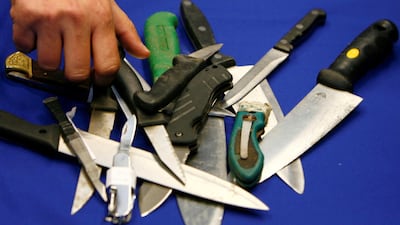British youth has been caught in a “perfect storm” of rising knife violence and the spread of gangs boosted by growing deprivation, a report published by parliament has found.
Serious violence among young people in Britain has increased dramatically in recent years, the home affairs committee concluded from a recent inquiry.
The authors offered scathing criticism of the departing government over its inability to tackle the problem, accusing it of failing to match its diagnosis of the problem with a workable solution.
The report’s figures paint a grim picture. According to the committee, over the past five years reported homicides have increased by more than a third.
Knife offences have risen by over 70 per cent. The number of under-18s brought to hospital after being stabbed rose by a third between 2013 and 2014 and another third between 2017 and 2018.
In London alone between June 2016 and June 2019, a 52 per cent rise in knife offences was recorded.
And the statistics show that across the country it is young men, more than any other group, who are being murdered in increasing numbers on the streets of Britain.
The surge in stabbings in Britain has had an effect on the country’s health system.
National Health Service admissions showed a 36 per cent rise between 2013 and 2018.
But the most striking statistic confronting the NHS relating to knife crime concerns the very young. Hospital admissions for knife attacks on those under the age of 16 have risen by 93 per cent since 2012.
Cuts to youth services, reductions to the policing budget and a growing number of children being excluded from school or growing up in social care have all played a part in the increase in youth violence.
“Teenagers are dying on our streets and yet our inquiry has found that the government’s response to the rise in serious youth violence is completely inadequate,” the committee’s chair, Yvette Cooper, said on Wednesday.
"They just haven’t risen to the scale of the problem. The Home Office has shamefully taken a hands-off approach to this crisis but it is a national emergency and must be treated like one. They need to get a grip."
The British system’s failure to break the cycle of deprivation and vulnerability that leads to knife crime and serious youth violence is at the centre of the problem, the report said.
Those children most in need of early support are not receiving it. Excluded children end up receiving less educational and emotional support, when they are the ones who need it most.
Increased demand among drug users has also fuelled youth violence, the report adds.
The phenomenon of the “24-hour ‘dial a dealer’" has pulled more young people into the orbit of criminal gangs involved in the illegal drug market.
The parliamentary committee concludes that any future strategy to combat violent crime among young people should also provide treatment for drug users.
As Britain looks to confront the violence among its young people the need for extra policing has come to the fore.
The report has welcomed increases in funding. As one of his first commitments as Prime Minister, Boris Johnson said an extra 20,000 officers would join the police force nationwide at a cost of £500 million (Dh2.2m) in the first year.
But the report calls for the government to go further on police funding, expressing concern at the short-term nature of the growth.


